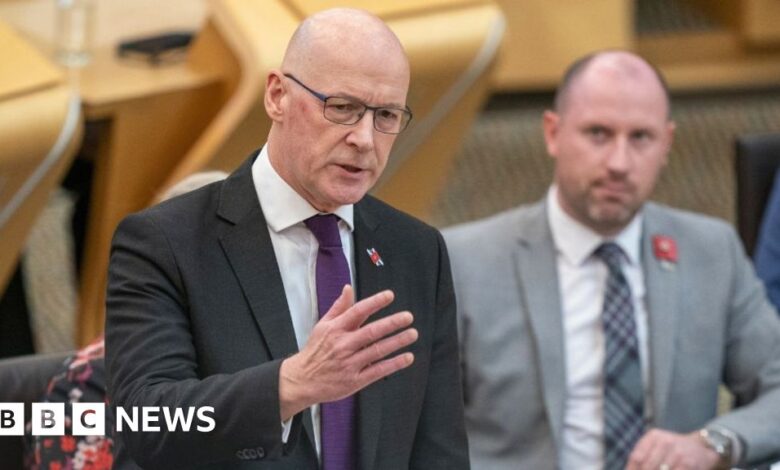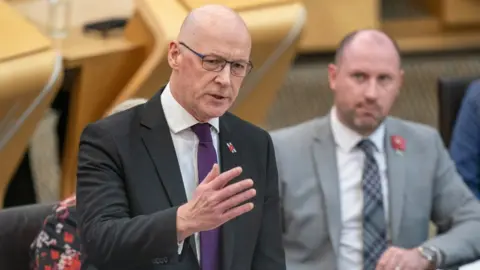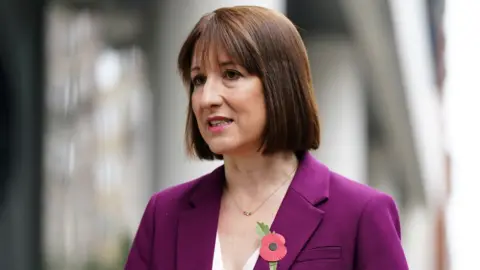John Swinney urges UK government to cover NI hike for charities

 PA Media
PA MediaJohn Swinney has urged the UK government to cover National Insurance increases for Scottish charities, GPs, social care providers and universities.
The first minister said the tax increase announced in the autumn Budget had caused “alarm across the country”.
His request is in addition to the £500m the Scottish government estimated it would cost to offset extra staff costs for public sector employers.
The Treasury has pledged to provide extra funds to help devolved administrations deal with the public sector costs, and says its tax regime for charities is “among the most generous of anywhere in the world”.
Although third sector groups are often hired by local authorities to provide public services, they are not currently expected to be reimbursed for the higher National Insurance contributions under Labour’s plans.
Doctors, care bodies and higher education institutions have warned cost increases could lead to closures.
‘Devastating consequences’
Speaking at the Social Enterprise Scotland conference in Edinburgh, Swinney warned the tax increase could have “devastating consequences for front line services”.
“It is completely unacceptable for our third sector to be punished as a result of decisions made by the chancellor,” he said.
“The UK Budget must not be balanced on the backs of Scotland’s charities.
“The chancellor clearly did not foresee the extent of the problems her decisions would cause when she published her Budget – the panic and confusion that has emanated from the Treasury since makes that clear.
“But there is still time for the UK government to do the right thing and meet these costs in full.”
 PA Media
PA MediaAt the moment, employers pay a rate of 13.8% on employees’ earnings above a threshold of £9,100 a year.
In the Budget, Chancellor Rachel Reeves said this rate would increase to 15% in April 2025, and the threshold would be reduced to £5,000.
In order to help the smallest businesses, the employment allowance – which allows companies to reduce their National Insurance liability – will increase from £5,000 to £10,500.
But a number of organisations in Scotland have warned the changes could put their members under severe pressure.
Doctors representatives said thousands of pounds in extra staff costs could close some practices.
The Scottish Council for Voluntary Organisations estimated the National Insurance hike would cost £75m for the sector – which it says employs 133,000 people, 5% of the country’s workforce .
It said voluntary bodies “cannot afford additional financial pressures”, adding: “Many have already had to subsidise public services with their own funds, and increasingly we are hearing of organisations having to close their doors.”
‘Catastrophic’
The Coalition of Care and Support Providers in Scotland said news of the tax hike had caused “panic” and would be “catastrophic” for its members unless compensation or exemptions were provided.
Universities Scotland said the National Insurance increase is expected to cost higher education institutions about £30m.
It added in a statement this week: “Against a backdrop of long-term decline in funding, increased costs of this scale cannot be absorbed without a settlement for Scotland’s universities that is commensurate with the challenges we face.”
The Scottish government is due to announce its budget for the next financial year on 4 December.
The UK government is yet to confirm how much compensation devolved administrations will receive to cover the costs of public sector employers, in addition to the £3.4bn of additional funding announced in the autumn Budget.
A spokesperson said more details would be set out “in due course”.
The Treasury has said the autumn Budget provided tax relief for charities and their donors worth just over £6bn for the tax year to April 2024.
A spokesperson added: “The government will protect the smallest businesses by increasing the Employment Allowance to £10,500 which means that next year 865,000 employers will pay no NICs at all.”





